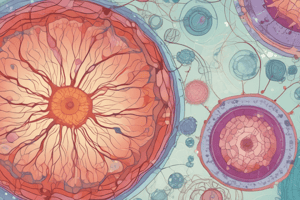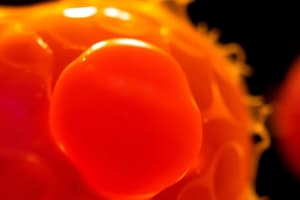Podcast
Questions and Answers
What are stem cells?
What are stem cells?
Undifferentiated cells with the ability to develop into specialized cell types and regenerate tissue.
What is the definition of a progenitor cell?
What is the definition of a progenitor cell?
Partially differentiated stem cells that have the potential to differentiate into specific cell types but cannot self-renew.
Which of the following is not a type of stem cell?
Which of the following is not a type of stem cell?
- Totipotent
- Transdifferentiated (correct)
- Multipotent
- Pluripotent
The three germ layers are ectoderm, mesoderm, and __________.
The three germ layers are ectoderm, mesoderm, and __________.
What is the role of hematopoietic stem cells?
What is the role of hematopoietic stem cells?
What factors influence the makeup of our microbiome?
What factors influence the makeup of our microbiome?
What do probiotics do when ingested?
What do probiotics do when ingested?
Fecal transplantation is a treatment that alters the microbiome.
Fecal transplantation is a treatment that alters the microbiome.
Flashcards are hidden until you start studying
Study Notes
Stem Cells
- Undifferentiated cells with the ability to develop into various specialized cell types and regenerate tissue.
- Self-renewal allows stem cells to divide and produce more cells of the same type.
- Progenitor cells are partially differentiated and can differentiate into specific cell types but lack self-renewal ability.
Developmental Potential of Stem Cells
- Totipotent cells: Can develop into any cell type, including all embryonic tissues.
- Pluripotent cells: Can give rise to cells from all three germ layers:
- Ectoderm: develops into the skin and nervous system.
- Mesoderm: forms muscle and bone.
- Endoderm: creates internal organs.
- Multipotent cells: Limited to specific cell types, such as Hematopoietic Stem Cells, which can develop into all types of blood cells.
Stem Cells in Treatment for Diseases
- Donor stem cells can be sourced from bone marrow and umbilical cord blood.
- Use of the individual’s own cells allows for reprogramming to achieve desired cell types.
Human Microbiome
- The microbiome consists of all organisms living in and on another organism.
- Individual habits, experiences, and environmental exposures shape the composition of one’s microbiome.
- Dietary fiber promotes the growth of beneficial microorganisms within the microbiome.
- Overly hygienic practices can reduce exposure to beneficial pathogens, while stress affects microbiome diversity.
Gut Microbiome
- Hosts approximately 10 trillion bacteria that assist in food digestion.
- Probiotics, like Lactobacillus and certain yeasts, when consumed, provide health benefits.
Fecal Transplantation
- A medical procedure aimed at altering the microbiome by introducing fecal matter from a healthy donor to restore gut health.
Studying That Suits You
Use AI to generate personalized quizzes and flashcards to suit your learning preferences.




